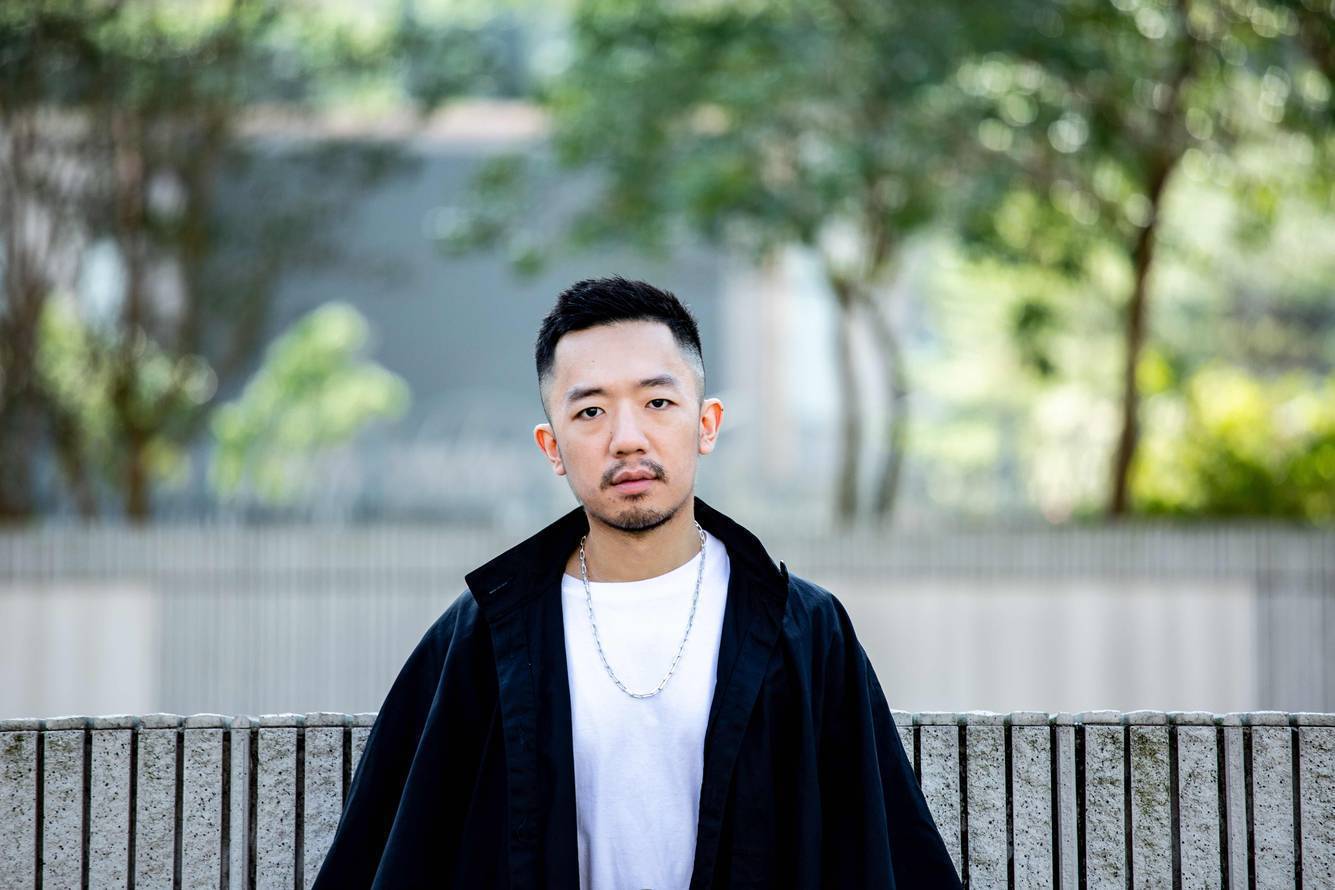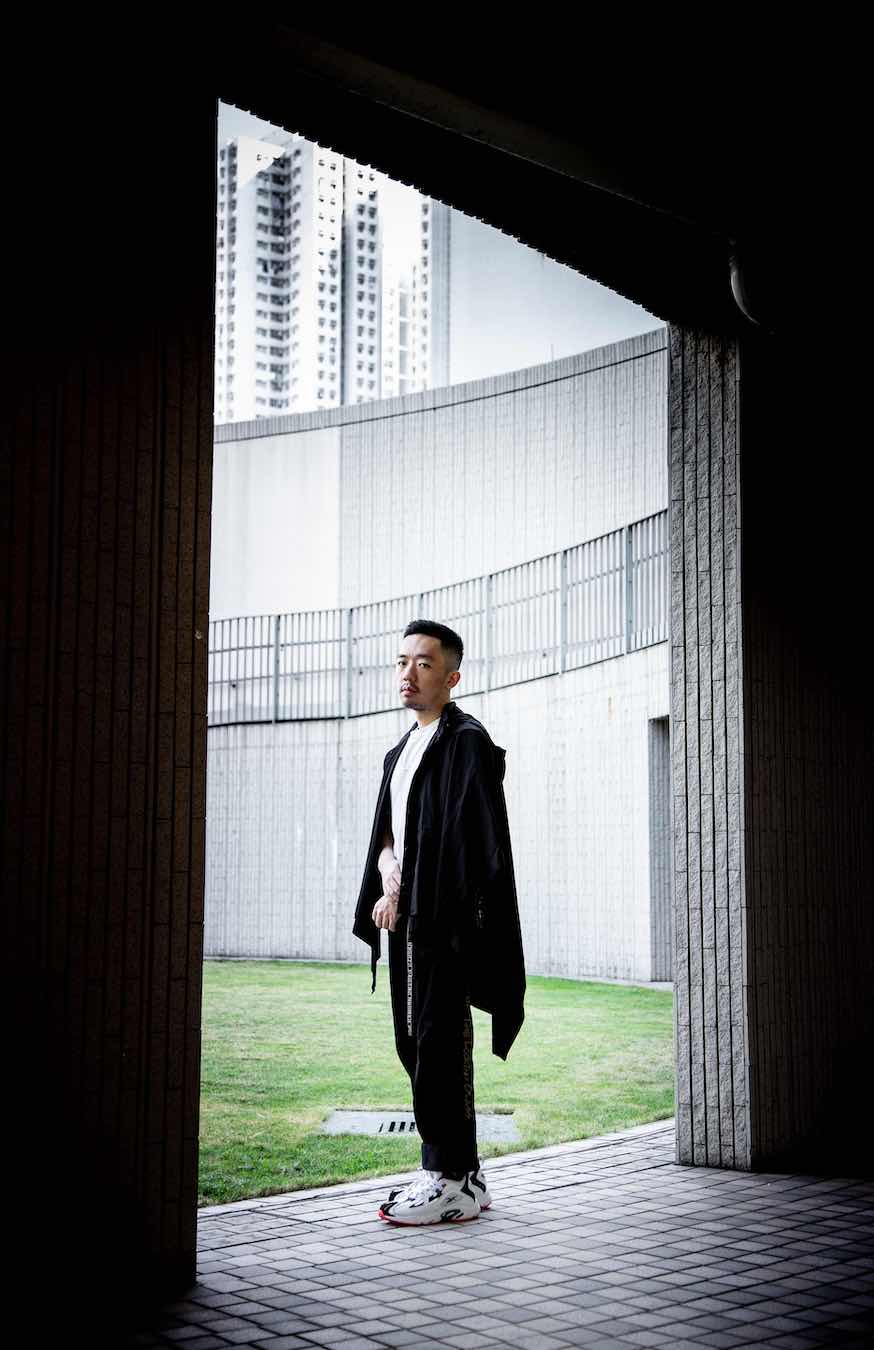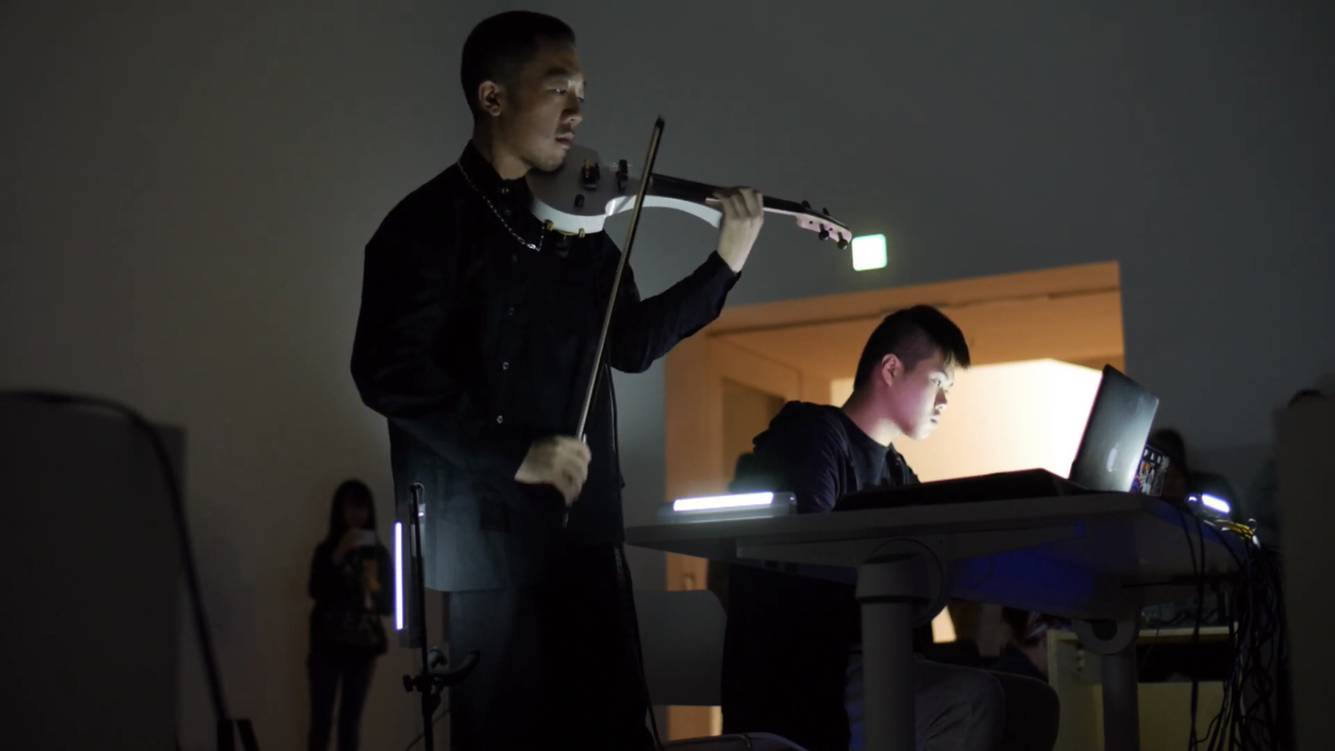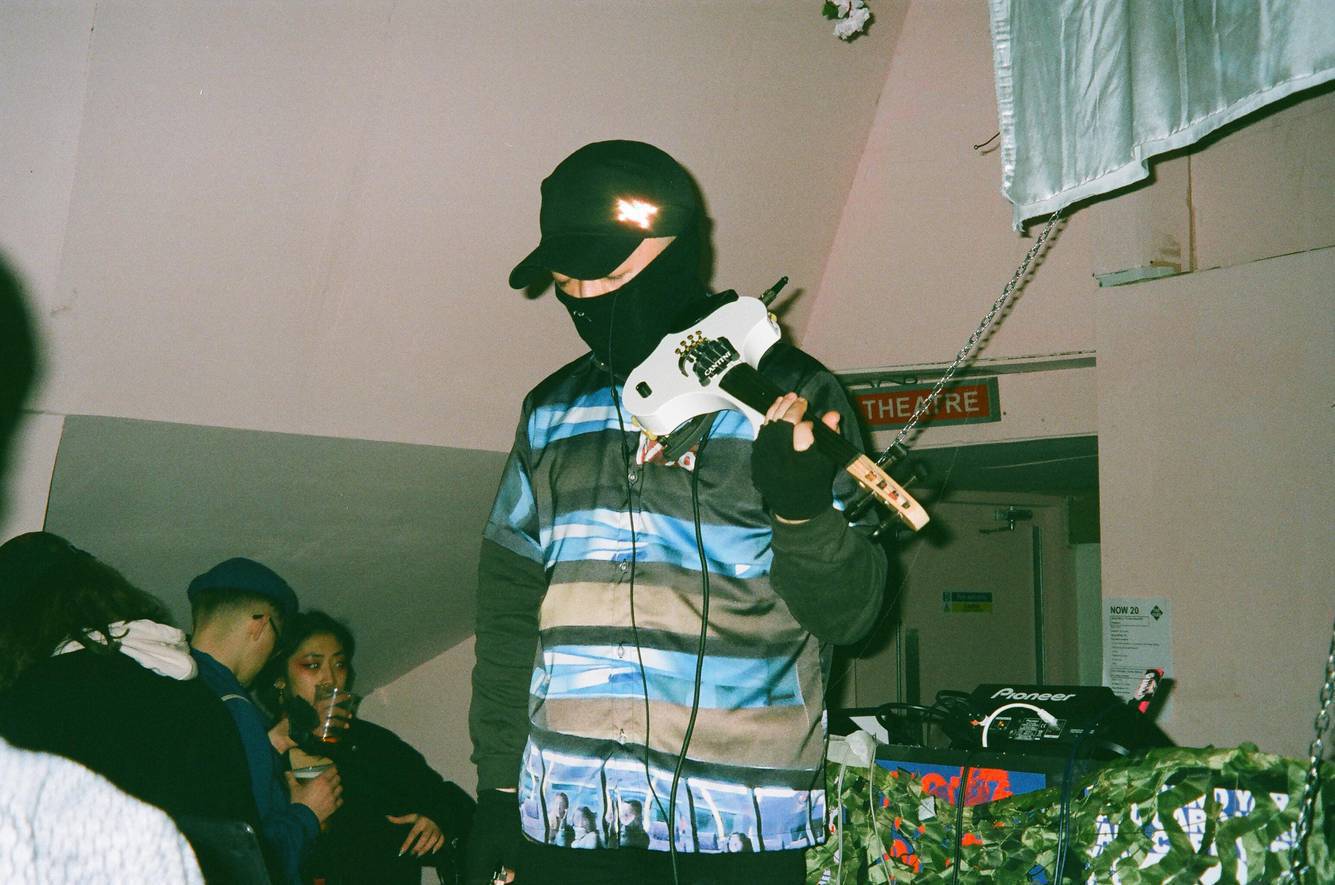by Brian Hioe
語言:
English
Photo Credit: Jex Wang
Brian Hioe spoke to Alexmalism, who researches electronic music culture as a Ph. D candidate at the City University of Hong Kong, and is also a DJ, producer, and sound artist. The following article originally appeared on Electric Soul, a Hong Kong-based electronic music magazine and ticketing platform, on December 21st, 2021.
Brian Hioe: Could you first introduce yourself for readers?
Alexmalism: I’m Alex from Hong Kong. I DJ and I produce music under the alias of Alexmalism. I was a sound artist—well, sound artist is a title that people use nowadays. What I did was play experimental music. Originally, I was trained in classical music as a composer.
I sometimes get a few gigs or freelance some jobs dealing with orchestration, arranging music for orchestra.
BH: How did you become interested in electronic music? I find there are a lot of people that start from classical backgrounds, such as yourself.

A: It’s either the violin or the piano. I think a lot of Asian kids learn one or two instruments.
For me, I had a rather different story. I was not forced to learn an instrument, I actually picked up the violin the moment when I watched a documentary on the Butterfly Lovers, the concerto. So I was inspired by the documentary. Then I decided to take up the violin, asking for tuition fees from my parents, and I began violin classes. Eventually, it turned into a black hole. [Laughs]
Before I learned how to play the violin, I was interested in music composition as well. I wanted to fulfill my middle school fantasy of being a superstar composer. I thought the idea of creating my own music was cool. It was my classical period.
It’s quite a long story of how I got into electronic music. Once I got into composition and music school, I was taught electronic music at school—but the more artistic, or western avant-garde styles of electronic music.
I wasn’t quite so interested in those kinds of music when I was studying, actually. So I almost fell into just making instrumental music. Like the classical or the contemporary styles of music composition. It was around 2012 or 2013 that I graduated from my degree in music composition.
I sort of got myself into an explosion of other things after my degree. I started to mingle around with people from the School of Creative Media at CityU. So I was exposed to other forms of art, like new media art, sound art. I was attending a lot of events, from Soundpocket. I got to know some sound artists from Hong Kong as well, like Sampson Young.
I was attending a lot of noise and experimental music gigs in Hong Kong as well. It sort of became like an incubation period for me being exposed to other forms of sound-related contemporary art, after I graduated.
Eventually, there was a time I was thinking about continuing my studies to get a Master’s Degree. I was lucky and got a scholarship to study at Goldsmiths in London. But there was a time I was thinking of whether I should do a Master’s in music composition or whether I should do something more creative.
In the end, I decided to do the degree at Goldsmiths in sonic arts. Somehow that led me further unknown areas of shitting around. Making weird experimental music or starting to call myself a sound artist.
That was a time for me when I was fooling around with the title and making stuff that was sort of unusual. You can check out all those artworks on my website, Alexyiu.com. I still have those documented.
If we’re talking about electronic music or the kind of music we call club music, I feel like it only came to me when I was in London. I was a student there in 2014. I got invited to go out during the night and I remember in Peckham in South London, there was a venue where they had regular parties. It was pretty nice.
There was a bloom of club music everywhere. Like Boiler Room—I actually attended my first Boiler Room in London as well. It was fun. I also dated someone in London that introduced me to a lot of music. From experimental music to techno music. The guy I dated was a music nerd, a rare breed that you can’t really run into in Asia. So he inspired me with a lot of music.
I started checking out XXX after I came back from London. After London, I became a sound artist somehow, but I also started exploring the club scene, sticking around XXX quite frequently. So in 2015 and onwards, I spent a lot of time at XXX, and different art venues in Hong Kong.
At one point, I sort of got tired of doing sound art. I had enough of the so-called contemporary art scene. It sounds brutal, but I find a lot of it BS.
Career-wise I shouldn’t say that. [Laughs] Because I still consider myself a person between all kinds of stuff. But I became more selective in my tastes. Some would say more acquired tastes in art and music. I started losing interest in certain stuff. I thought it would be the end of my artistic career if I lost interest in the things that I was doing.
Eventually, I picked up making music again around 2018 and 2019. That’s not that long ago. I started making tracks and beats in my bedroom. I just wanted to make some beats, I wasn’t thinking about my own training in contemporary music at all. Then I started making those beats starting from zero, back to zero again.
I got a license for Ableton, so I was messing around with Ableton. Eventually, at one point in 2018, I felt like I wanted to make something better. Something greater. I spent a lot of time at home. I didn’t really go out and I was a freelancer for quite a long period. So I didn’t spend my time wisely, I was supposed to work full time, I should keep my schedule busy, but I wasted most of my time just being an artist.
You try to spend a lot of time thinking about what you want to do and you want to apply for residencies or try to mingle around to beg for opportunities for people and that kind of stuff. It affected my psyche a lot. I felt that I should start to make something on my own.
So in 2018, around August, I started making a lot of music. That music became my first EP, TKO, that I released on Absurd TRAX in 2018. This is my “official” music release.
Alexmalism · EP – TKO
That’s how I got into electronic music. It’s a long story, I skipped a lot of details.
BH: How did you start researching electronic music? You’re working on researching deconstructed club now.
A: When we’re looking into the history of music, or certain genres of music, we’re looking into a certain historical perspective. Because we’re always going through history—and this is inevitable in my opinion. But such historical aspects are also an ongoing tradition.
We talk about the history of Cantopop in the 1970s and 1980s. It is still an ongoing tradition, it’s constantly evolving into what we see nowadays. And that applies to any other forms of genres. Particularly with club music.
The moment when we try to find a term to describe electronic music, such as deconstructed club, it’s a way that we try to historicize the subject. We try to put the musical practice into a genre that enables us to analyze.
But this is also problematic in a sense. As I conduct my ethnography, what I realized is that the musical definition or musicality of deconstructed club is very vague. It’s driven by the community and people who sort of know each other in the scene—well, when I use “scene”, it’s also a problematic term.
BH: Would you say it’s Bourdieusian?
A: I don’t really use Bourdieu terms like field. Because I feel that field is very driven by the boundary. I feel that it’s more like a Deleuzian sense of network.
BH: Which fits more with deconstructed club.
A: Yes, I feel like the network is very interconnected. You are inside or outside of the network. The network is very driven by social media and the connections online. When I was continuing my interviews with people, the influence of people moving around and how people met each other online are inevitable. These are the main factors how I look into deconstructed club music.
It was a “failure” in the West. Well, this is a big claim. I would say that a lot of time, people try to keep up with a sub-genre, like nightcore or vaporwave, or whatever this terminology in recent times. They couldn’t really solidify what the terms mean until it became other people started putting the genre into a definition and tried to categorize it into some form of tree branch.
I find it particularly western, in this sense. This is such an obsession with people in the West, where they want to codify the genre and put names and tags on stuff.

Photo credit: Swing Ho
BH: That it was reifying.
A: My research has really focused on East Asia. Because I feel that when club music came to East Asia in big cities—I look into five different cities, Taipei, Hong Kong, Shanghai, Seoul, and Tokyo.
There are very different dynamics in comparison to club music in the West. And even though deconstructed club music remains underground, say, starting from New York and Europe in the 2010s, it remains at the margin but is considered to be some form of avant-garde or radical, in having a different context for how music is being played in a club, how they develop an aesthetic tied with contemporary art. It’s strongly associated with GHE20G0TH1K from New York, and south American musical genres.
In East Asia, that came into a sort of alien environment, but the spirit of how DJs start messing around with the tracks remained. Or when they throw different genres of music from Mandopop to hardcore, nightcore, or drum and bass together in the club.
That sort of challenges the western hegemony of club music. What I see in deconstructed club music in East Asia is that we are forming our own takes or narratives of club music, but also based on the very hybrid and globalized society that we are living in, that is responding to what Euro-American takes on club music are.
That’s the angle of my research.
BH: Do you consider yourself more one thing another? DJ, producer, artist, researcher. Or they all things you’re sort of bouncing around in between.
A: I’m a person for sure, I’m not an alien. I consider all the stuff I do to me accumulations of things. When you have enough time to have exposure into different kinds of stuff, you realize they might not necessarily be related. You might not necessarily see the connection between John Cage and deconstructed club music. I find it still inspiring, I think. There are always some grey areas within those things.
Maybe John Cage and deconstructed club are two extremes. But if you look at the boundaries between deconstructed club and experimental music. there are areas in which people put club elements into experimental music. This is not a totally defined area. Instead, when we are looking through some musicians—like some pop musicians like Arca or Sophie—or the kind of music they put out, you can see a lot of elements from the avant-garde tradition of music. The ways that they use or manipulate sound or take gestural or textual thinking into the music is unusual. It’s not something that is easily defined by any existing stuff.
One thing I find more detached is my academic research and my own practice. I intentionally make a division. Somehow, the reason I decided to do my Ph. D is a mixture of reasons—because of financial reasons, the culture, or the connections that I had—which allowed me to conduct ethnography in the field.
I feel the necessity of telling the story of these kinds of people and music and putting it into a perspective of a more grand narrative of things to showcase how I perceive the connection. How I try to tell the story of deconstructed club in East Asia.
Some people asked me, “Hey Alex, why don’t you do a practice based research?” To make some music to fulfill the self-prophecy of deconstructed club music. But I said, “No, I’m not going to do that.” This is trying to make artworks that fall into the examination of the academic system.
I’ve seen it happen in contemporary music composition and I don’t really think this should happen with this kind of music. Because I feel that instead of trying to institutionalize the practice, I would rather look at it from an ethnographic perspective and try to understand what the actual fuck the music and the culture is about, instead of trying to make it so sound so clever or sophisticated through my own artworks.
I don’t see the necessity of trying to intellectualize the music. Maybe somebody thinks it should be, but I don’t think I’m interested in doing that.

BH: What are current projects you’re working on?
A: Besides my Ph. D, I’m working on my next release. Not entirely sure if it’s going to be a single or an album. But it’s going to be more pop. I’m going to sing—obviously, with my own voice. And I’m going to make my own music video. Topic-wise, it’s going to be something more about technology-related. Looking into making artworks with AI and that kind of stuff.
I want to incorporate those kinds of elements into my next release. I’ve been interested in coding and 3D stuff recently. My mind was blown by these technical issues that I encountered. I think I’m going to sing in Cantonese.
This is a very weird Cantopop plus deconstructed club. But with a sense of Cantopop. It’s hard to say what it’s going to be like. Because I haven’t finished all the music. I still have a lot of things going on with the visual and thinking about whether I should make some more experimental tracks in Cantonese with the music as well. I’ve been trying to explore that aspect. I think the subject matter is going to be dealing with a lot of social media, technology, AI, and how we perceive our reality in the age of people using the term techno-feudalism.
I tend to not really work as a pop musician. But I feel like this is going to be more pop. It’s not like I’m going to release a single every month just to be a pop artist, but I’m going to call it a magnum opus for myself after my first EP. Because my EP was something people were somehow interested in. This time, I want to make it even more interesting, I guess.



